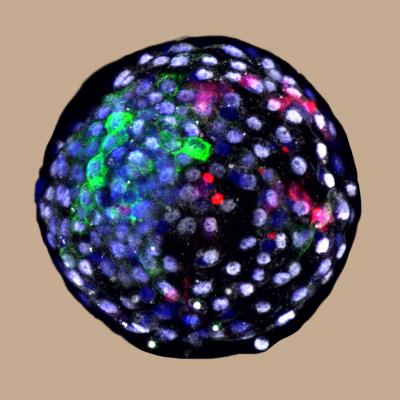
Credit: Weizhi Ji, Kunming University of Science and Technology
Investigators in China and the United States have injected human stem cells into primate embryos and were able to grow chimeric embryos for a significant period of time–up to 20 days. The research, despite its ethical concerns, has the potential to provide new insights into developmental biology and evolution. It also has implications for developing new models of human biology and disease. The work appears April 15 in the journal Cell.
“As we are unable to conduct certain types of experiments in humans, it is essential that we have better models to more accurately study and understand human biology and disease,” says senior author Juan Carlos Izpisua Belmonte, a professor in the Gene Expression Laboratory at the Salk Institute for Biological Sciences. “An important goal of experimental biology is the development of model systems that allow for the study of human diseases under in vivo conditions.”
Interspecies chimeras in mammals have been made since the 1970s, when they were generated in rodents and used to study early developmental processes. The advance that made the current study possible came last year when this study’s collaborating team–led by Weizhi Ji of Kunming University of Science and Technology in Yunnan, China–generated technology that allowed monkey embryos to stay alive and grow outside the body for an extended period of time.
In the current study, six days after the monkey embryos had been created, each one was injected with 25 human cells. The cells were from an induced pluripotent cell line known as extended pluripotent stem cells, which have the potential to contribute to both embryonic and extra-embryonic tissues. After one day, human cells were detected in 132 embryos. After 10 days, 103 of the chimeric embryos were still developing. Survival soon began declining, and by day 19, only three chimeras were still alive. Importantly, though, the percentage of human cells in the embryos remained high throughout the time they continued to grow.
“Historically, the generation of human-animal chimeras has suffered from low efficiency and integration of human cells into the host species,” Izpisua Belmonte says. “Generation of a chimera between human and non-human primate, a species more closely related to humans along the evolutionary timeline than all previously used species, will allow us to gain better insight into whether there are evolutionarily imposed barriers to chimera generation and if there are any means by which we can overcome them.”
The investigators performed transcriptome analysis on both the human and monkey cells from the embryos. “From these analyses, several communication pathways that were either novel or strengthened in the chimeric cells were identified,” Izpisua Belmonte explains. “Understanding which pathways are involved in chimeric cell communication will allow us to possibly enhance this communication and increase the efficiency of chimerism in a host species that’s more evolutionarily distant to humans.”
An important next step for this research is to evaluate in more detail all the molecular pathways that are involved in this interspecies communication, with the immediate goal of finding which pathways are vital to the developmental process. Longer term, the researchers hope to use the chimeras not only to study early human development and to model disease, but to develop new approaches for drug screening, as well as potentially generating transplantable cells, tissues, or organs.
An accompanying Preview in Cell outlines potential ethical considerations surrounding the generation of human/non-human primate chimeras. Izpisua Belmonte also notes that “it is our responsibility as scientists to conduct our research thoughtfully, following all the ethical, legal, and social guidelines in place.” He adds that before beginning this work, “ethical consultations and reviews were performed both at the institutional level and via outreach to non-affiliated bioethicists. This thorough and detailed process helped guide our experiments.”
###
This work was supported by the National Key Research and Development Program, the National Natural Science Foundation of China, Major Basic Research Project of Science and Technology of Yunnan, Key Projects of Basic Research Program in Yunnan Province, High-level Talent Cultivation Support Plan of Yunnan Province and Yunnan Fundamental Research Projects, UCAM, and the Moxie Foundation.
Cell, Tan et al.: “Chimeric contribution of human extended pluripotent stem cells to monkey embryos ex vivo” https://www.cell.com/cell/fulltext/S0092-8674(21)00305-6
Cell (@CellCellPress), the flagship journal of Cell Press, is a bimonthly journal that publishes findings of unusual significance in any area of experimental biology, including but not limited to cell biology, molecular biology, neuroscience, immunology, virology and microbiology, cancer, human genetics, systems biology, signaling, and disease mechanisms and therapeutics. Visit: http://www.
Media Contact
Carly Britton
[email protected]
Related Journal Article
http://dx.




